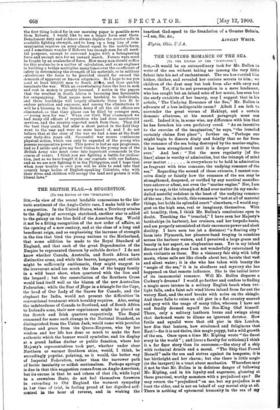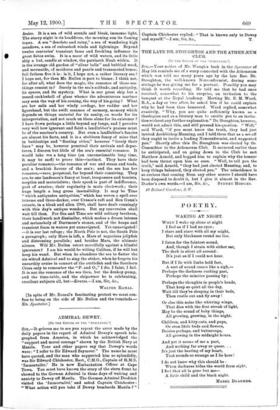THE UNDYING ROMANCE OF THE SEA.
[To THE EDITOR OP THE "SPECTATOR."] Sin,—It would be an extraordinary task for Mr. Haiku to write of the sea without taking me (among the very little fishes) into his net of enchantment. The sea has carried him hither, thither, and revealed her curious secrets to him ; we children of the dust may but look from afar with envy and wonder. Yet, if it be not presumption in a mere landsman, who has caught but an inland echo of her music, has seen but the surfy outskirts of her beauty, may I suggest that in his article, The Undying Romance of the Sea," Mr. Sullen is advocate of a less indisputable cause ? Albeit I am loth to surrender the great worms of Hakluyt, and a certain demonic albatross, at his second paragraph none can cavil. Indeed it is, in some wise, my difference with him that he has forsaken his own prefatory creed. "As an incentive to the exercise of the imagination," he says, "the ironclad certainly claims first place "; further on, "Perhaps one might begin to discern dimly and faintly that so far from the romance of the sea being destroyed by the marine engine, it has been strengthened until it is deeper and truer than ever." And last : " Not the mere regularity [of the liner] alone is worthy of admiration, but the triumph of mind over matter is everywhere to be held in admiration as fragrant with true romance, the undying romance of the sea." Regarding the second of these extracts, I cannot con- ceive dimly or faintly how the romance of the sea may be strengthened, deepened, or verified by any nautical manufac- ture ashore or afloat, not even the " marine engine." Nor, I am sorry to say, is the triumph of mind over matter (in my smoke- dulled nostrils) redolent in the least of the undying romance of the sea ; for, in truth, this romance is "not at all of material things, but holds its splendid court" elsewhere,—I would sug- gest on the high seas, real or imaginary, themselves. With all humility, then, I think Mr. Bullen's conclusions open to doubt. Touching the " ironclad," I have seen her Majesty's battleships (in harbour), her cruisers, and her torpedo-boats, and am properly astonished at their enormous power and sleek docility. I have seen too (at a distance) "a floating city" loom into Plymouth, her pleasure-band braying in sunshine across the harbour waters, and I perceived a large grace and beauty in her aspect, an elephantine ease. Yet in my inland dreams of the deep seas I am not wonderfully entertained by such visitants as these. But a visionary fair ship with lofty masts, whose sails are like clouds about her, haunts that vast and silent water; it is she who has taken with beauty the "magic of the sea," it is in aloofness and mystery she has happened on that remote influence. She is the initial letter of its immemorial romance. Will Mr. Bullen disperse a Cockney's dreams ? I would go farther and confess to finding a magic more intense in a solitary English beach when twi- light falls, and a faint salt wind blows inland from far out the watery East, and the surf breaks with noise on the shingle. And there falls to rains an old pier in a flat country scarred and grey with the usage of many tides, whereon I have sat and fondly deemed myself the Sea-King Olaf himself. There, only a solitary lanthorn burns and swings along that darkened waste to Mame an ignorant devotee. How futile and squalid were that old pier in this London, how dim that lantern, how straitened and fuliginons that East i—for it is not theirs, this magic poppy, but a wild growth of the sea. Once upon a time Mr. Kipling wrote "the finest story in the world " ; and (sans a faculty for criticism) I think it a far finer story than its successor,—the story of a ship with technical details and a moral. "The Ship that Found Herself " sails the sea and strives against its tempests; it is her birthright and her charm; but else there is little magic (to the inexpert) in a tract about mechanics. Wherefore may it not be that Mr. Bullen is in delicious danger of following Mr. Kipling, and in his loyalty and eagerness, glancing at these practical, worthy monsters with a prejudiced eye ? He may return the "prejudiced " on me, but my prejudice is at least the elder, and is not on behalf of any mortal ship at all. There is nothing of ephemeral humanity in the sea of my
desire. It is a sea of wild sounds and bleak, immense light. The starry night is its headdress, the morning sun its flaming topaz. A sea "desolate and rainy," a sea of wandering high meadows, a sea of unleashed winds and lightnings. Beyond twelve centuries' transient fame and freckling influence its great fishes swim. It is a moor of wild waters, and its little ship a hut, candle at window, the patriarch Noah within. It is the' range old garden of "silver bells" and bubbled weed, and mermaids, of moidores and pearls and transmuted bones; full fathom five it is: is it, I hope not, a rather literary sea ? I hope not, for then Mr. Bullen is part to blame; I think not, for after all, what does the magic, the romance of these sea- things consist in? Surely in the sea's solitude, and antiquity, its spaces, and its mystery. What is our great ship but a tossed cockleshell of glass whence the adventurous mariner may scan the way of his coming, the way of his going ? What are her sails and her windy cordage, her rudder and her figurehead, but the swift sesames of memory, memory which depends on things material for its sanity, on words for its interpretation, and not much on these alone for its existence ? I have flown perhaps a little beyond my lungs, and I perceive very well how ignorant and faint a landlubber's praises must be of the mariner's country. But even a landlubber's fancies are almost his facts, and it is a stubborn fancy of mine that in battleships and "floating cities," however " lovely their lines" may be, however punctual their arrivals and depar- tures, I discern but little of the sea's essential romance. It would take me a long time (an unconscionable long time, it may be said) to prove this—instinct. They have their peculiar romance,—the romance of war and steam and trade, and a brackish flavour of the sea's; and the sea has her romance,—rare, perpetual, far beyond their conniving. They are, to one landsman's fancy at least, trespassers and tourists, sceptics and materialists ; their speed is part of indifference, part of avarice; their regularity is mute clockwork ; their huge length a long gross insensibility. It may be Time "which antiquates antiquities," which has woven a spell over trireme and three-decker, over Crusoe's raft and Ben Gunn's coracle, in a bleak and alien 2900, shall have dealt cunningly with this day's antique wonders. But my conversion shall wait till then. For Sea and Time are wild solitary brethren, their handiwork not dissimilar, which makes a dream intense and melancholy of Dartmoor's stones, and of the heaps and transient foam in waters yet unnavigated. Yet unnavigated ! —it is our last refuge ; the North Pole is not, the South Pole a paragraph; only Mars is left, a Mars of sagacious jellyfish and distressing parallels; and besides Mars, the ultimate silence. Will Mr. Bullen retort mercifully against a blissful ignorance? I am his would-be willing Caliban, if he will but keep his wand. But when he abandons the sea to flatter the six-witted Admiral and to sing the stoker, when he forgets his unearthly cruise in consort of the cuttlefish and the Southern Cross only to remember the "P. and O.," I die, I faint, I fail. It is not the romance of the sea then, but the donkey-pump, and the time-table, and the shipowner he is celebrating, excellent subjects all, but—diverse.—I am, Sir, &c.,
WALTER RADIAL.
[In spite of Mr. Ramal's fascinating protest we must con- fess to being on the side of Mr. Sullen and the ironclads.— ED. Spectator.]







































 Previous page
Previous page